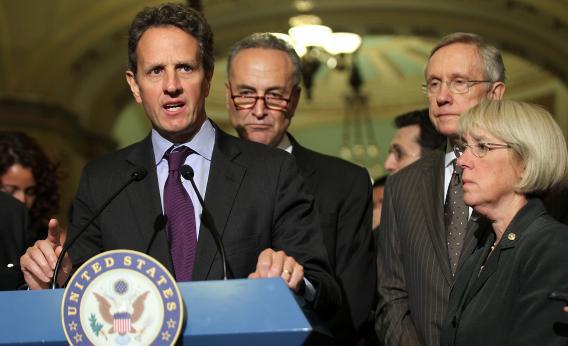This is a little lost in the dust of the fiscal cliff negotiations, but the White House’s opening bid contains as a sub-theme a really smart idea on the debt ceiling.
The debt ceiling, to recall, was for a long time a kind of traditional venue for partisan grandstanding in American politics. And there’s nothing wrong with a little grandstanding. There’s always a theatrical element to politics, and this was just a part of the way things are done in America. There was even a West Wing scene about it:
But in the winter of 2010-11 the debt ceiling became dangerous. Some combination of malign intent on the part of John Boehner and strategic miscalculation on the part of Barack Obama weaponized it. Rather than simply subjecting the president to a verbal lashing over his desire to raise the debt ceiling, Boehner ended up using the threat of a potentially economy-destroying fiasco to extract concrete policy concessions. Once that tactic’s been put on the table, no leader of either party can afford not to use it. But if you play the brinksmanship game too many times, sooner or later someone is going to go over the edge. That’s a risk the country shouldn’t be running, and over the long term it’s to nobody’s advantage to keep playing the game.
The Geithner proposal is to turn the debt ceiling back into a grandstanding game by flipping the order of operations. When the president goes above the ceiling, Congress will have the right to pass a resolution of disapproval. Then the president can veto the resolution. In theory, Congress can override that veto with a two-thirds supermajority, but in the real world that’ll never happen. Congress gets its chance at symbolic opposition, and there’s no risk to the economy. It’s a great idea.
On Twitter last time, Tim Carney was trying to say that this would be an abrogation of congressional responsibility and a huge increase in executive power, but that’s nonsense.
Every dollar the federal government spends is spent according to laws Congress has passed. Every dollar of tax revenue that comes in does so because of taxes Congress has enacted. The Treasury Department’s borrowing of money to make up the gap between Congress’ spending and Congress’ taxing isn’t any additional authority to spend or do anything. It’s the very model of Congress making laws and the executive implementing them.
